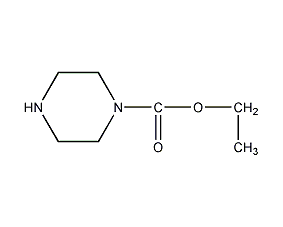1-Piperazinecarboxylic acid ethyl ester


Structural formula
| Business number | 03C5 |
|---|---|
| Molecular formula | C7H14N2O2 |
| Molecular weight | 158.20 |
| label |
Ethyl N-piperazinecarboxylate, Ethyl N-piperazinecarboxylic acid, Piperazine-1-hydroxy acid ethyl ester, Piperazine-1-carboxylic acid ethyl ester, 1-Ethoxycarbonylpiperazine, Piperazine-1-carboxylic acid ethyl ester, Alicyclic compounds |
Numbering system
CAS number:120-43-4
MDL number:MFCD00005964
EINECS number:204-395-2
RTECS number:TL1378000
BRN number:125780
PubChem ID:None
Physical property data
1. Characteristics: Colorless viscous liquid.
2. Density (g/mL,20℃): 1.08
3. Relative vapor density (g/mL,air =1): Undetermined
4. Melting point (ºC): 120
5. Boiling point (ºC,normal pressure):273
6. Boiling point (ºC,3mmHg): Undetermined
7. Refractive index:1.477
8. Flashpoint (ºC): >110
9. Specific rotation (º): Undetermined
10. Autoignition point or ignition temperature (ºC): Undetermined
11. Vapor pressure (mmHg,25ºC): Undetermined
12. Saturated vapor pressure (kPa, ºC): Undetermined
13. Heat of combustion (KJ/mol): Undetermined
14. Critical temperature (ºC): Undetermined
15. Critical pressure (KPa): Undetermined
16. Oil and water (octanol/Log value of the partition coefficient for water: undetermined
17. Explosion upper limit (%,V /V): Undetermined
18. Lower explosion limit (%,V/V): Undetermined
19. Solubility: Undetermined
Toxicological data
1, acute Toxicity: Mouse intraperitoneally LD50: 138mg/kg
Ecological data
Slightly harmful to water.
Molecular structure data
5. Molecular property data:
1. Molar refractive index: 40.94
2. Molar volume (m3/mol):147.6
3. isotonic specific volume (90.2K):360.8
4. Surface Tension (dyne/cm):35.6
5. Polarizability(10-24cm3):16.23
Compute chemical data
1. Reference value for hydrophobic parameter calculation (XlogP): -0.2
2. Number of hydrogen bond donors: 1
3. Number of hydrogen bond acceptors: 3
p>
4. Number of rotatable chemical bonds: 2
5. Number of tautomers: none
6. Topological molecule polar surface area 41.6
7. Number of heavy atoms: 11
8. Surface charge: 0
9. Complexity: 132
10. Number of isotope atoms: 0
11. Determine the number of atomic stereocenters: 0
12. Uncertain number of atomic stereocenters: 0
13. Determine the number of chemical bond stereocenters: 0
14. Number of uncertain chemical bond stereocenters: 0
15. Number of covalent bond units: 1
Properties and stability
Avoid contact with oxides.
Storage method
Save in a cool, dry place. Make sure the workspace has good ventilation. Keep away from sources of fire and store away from oxidizing agents.
Synthesis method
None
Purpose
Mainly used as dye intermediates
P>
3. isotonic specific volume (90.2K):360.8
4. Surface Tension (dyne/cm):35.6
5. Polarizability(10-24cm3):16.23
Compute chemical data
1. Reference value for hydrophobic parameter calculation (XlogP): -0.2
2. Number of hydrogen bond donors: 1
3. Number of hydrogen bond acceptors: 3
p>
4. Number of rotatable chemical bonds: 2
5. Number of tautomers: none
6. Topological molecule polar surface area 41.6
7. Number of heavy atoms: 11
8. Surface charge: 0
9. Complexity: 132
10. Number of isotope atoms: 0
11. Determine the number of atomic stereocenters: 0
12. Uncertain number of atomic stereocenters: 0
13. Determine the number of chemical bond stereocenters: 0
14. Number of uncertain chemical bond stereocenters: 0
15. Number of covalent bond units: 1
Properties and stability
Avoid contact with oxides.
Storage method
Save in a cool, dry place. Make sure the workspace has good ventilation. Keep away from sources of fire and store away from oxidizing agents.
Synthesis method
None
Purpose
Mainly used as dye intermediates
